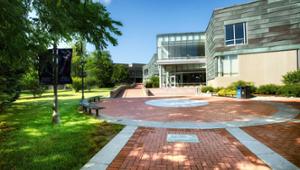
Economics
The goal of the Economics Department is to educate engaged citizens who understand the economic institutions they are part of and who are able to assess and develop opportunities for responsible participation and positive social change.
About the Major
Economics students at 51Ń‘∆ś investigate a wide range of social and economic issues. Students might find themselves exploring the economic legacy of redlining, seeking evidence about the presence and impact of discrimination, evaluating the effects of an increase in the minimum wage, or assessing the effectiveness of policy aimed at improving the environment. In the process, economics concentrators develop strong data analysis skills and learn how to make arguments with quantitative evidence. Some students work with faculty as teaching or research assistants and a few have published collaborative work in professional journals. Economics is a STEM concentration at 51Ń‘∆ś.
Students Will Learn To:
- Design a research plan to address an economic question
- Competently implement a research plan
- Communicate findings from the research plan
A Sampling of Courses

The Economics of Technology and Innovation
An examination of the nature and implications of innovation and technological change. We will investigate the history and economic theory of innovation and technological progress, related policy debates, and future prospects. Particular attention to the implications of recent developments in information technology and robotics for labor markets and the distribution of economic wellbeing.
Explore these select courses:
Examines differences in economic outcomes by race, gender, sexual orientation, religion, or other personal characteristic. Topics include 1) identification of discrimination in different markets including (but not limited to) the labor, education, and credit/housing market, and 2) evaluation of the effectiveness of policies aimed at reducing discrimination. This course places a special emphasis on developing professional presentation and discussion skills, teaching students to discuss controversial topics in a thoughtful and respectful manner.
A study of individual level investment decisions and the equilibrium determination of asset prices. Mean-variance analysis motivated by the tradeoff between risk and return. An introduction to asset pricing models, including the CAPM and multi-factor models. An introduction to derivatives, including stock options, futures and swaps. Discussions of the Efficient Markets Hypothesis, arbitrage, and contributions from behavioral finance. Other topics may include: fixed income pricing, Arrow-Debreu securities and the completeness of markets, and the binomial asset pricing model.
Meet Our Faculty
international economic development and labor economics
development, urban, and behavioral economics; applied econometrics
formation of middle classes in developing countries; effects of short-term capital flows on the Turkish economy and economic development; international finance and political economy of the Middle East
industrial organization, health economics, economics of non-profits, applied econometrics
macroeconomics, monetary economics, macro-finance
environmental, energy, and behavioral economics; applied econometrics
Economic history, political economy, law and economics
Christophre Georges
Associate Chair, Elias W. Leavenworth Professor of Economics
macroeconomics
economics of poverty, immigration and immigrant policy
International trade and development economics
Ann Owen
Professor of Economics and the Henry Platt Bristol Professor of Public Policy
long-run growth, inequality, and sustainability
Macroeconomics, monetary and fiscal policy, and international economics
profit sharing and flexible workplace practices and their effects on firm performance; prior information and biased estimation methods
Labor economics, behavioral economics
Economics of education, marriage/family economics, and labor economics
health and health care, higher education, economics of happiness
behavioral and experimental economics
Faces & Spaces
The Kirner-Johnson Building, also known as KJ, houses the offices for faculty members in economics. The building features an atrium, team rooms for working on group projects, and five case-method classrooms with the latest technology to support teaching and learning.










Careers After 51Ń‘∆ś
51Ń‘∆ś graduates who concentrated in economics are pursuing careers in a variety of fields, including:
- Senior Vice President, Morgan Stanley Dean Witter Reynolds
- Physician, Orlando Heart Center
- Assistant Professor of Economics, Williams College
- 1st Lt., U.S. Marine Corps
- English Teaching Assistant, U.S. Fulbright Program
- Vice Chairman, General Electric
- Director of International Programs, Michigan State University
- Associate Director, CBS News
- Psychiatrist, Buffalo Veteran’s Hospital
- Senior Policy Analyst, Council of State Governments Justice Center
- Director, Deutsche Bank Securities
Explore 51Ń‘∆ś Stories

2024 Bristol Fellows to Explore Orchid Culture, the Potential of Trash
Ann ‚ÄúAnnie‚ÄĚ Kennedy ‚Äô24, an economics and chemistry double concentrator, and Luis Felipe L√≥pez Cruz ‚Äô24 received 51Ń‘∆ś‚Äôs prestigious Bristol Fellowship. The program is designed to ‚Äúencourage discovery of self and the world, a greater appreciation and understanding of people and culture, and to enable individuals to act on great ideas through independent study projects.‚ÄĚ

‚ÄėBeing a Refugee is Not a Choice‚Äô
Professor of Economics Erol Balkan introduces ‚ÄúDisplaced and Dispossessed,‚ÄĚ a collection of photographs he has taken of Syrian refugees at their camps in Turkey.

Davis ‚Äô23 ‚ÄúSpends Every Day Learning‚ÄĚ as Goldman Sachs Intern
Olivia Davis ‚Äô23 is an asset management operations summer analyst at Goldman Sachs. As she unravels financial information, she learns the nuances of fixed income insurance and bilateral products. They‚Äôre complicated concepts to understand ‚ÄĒ and even more complicated to manage ‚ÄĒ but she appreciates the challenge.
Contact
Department Name
Economics Department
Contact Name
Emily Conover, Chair
Clinton, NY 13323

















